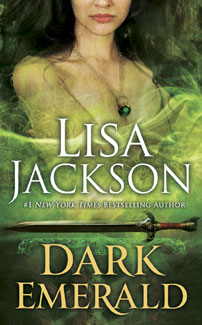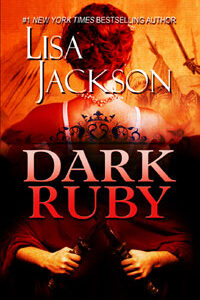Great Forest, Wales
Winter 1271
Lodema’s skin prickled though she warmed herself by the fire. Something was wrong. She felt in in her bones and sensed it in the frigid winter air.
Cold as demon’s breath, the wind whistled through the worn thatches of her small hut, and the premonition that there was death in the forest clung to her as hungrily as leeches to a naked man. ‘Twas a feeling she couldn’t ignore, a sensation that time and time again had proved to be a warning of worse times yet to come.
Using the charred wooden spoon, she stirred the mutton stew that bubbled in the blackened pot suspended over glowing coals. Her young cat, a mottled creature with glassy eyes, was perched on the shelf where she kept her herbs, candles, and lengths of cord. “Ye fell it, too, don’t ye, Luna? There be trouble and it’s comin’ our way.”
Luna lifted a paw and, using her long tongue, washed her face.
Somewhere not too distant a baby cried. Soft. Muffled.
Lodema stiffened.
The cat froze.
Nay. Couldn’t be. No babe would be out on as dark and cold a night as this.
Yet she heard it again. A pitiful, lonely wail.
“By the saints.”
Lodema dropped the spoon. There was no babe. Couldn’t be. Not this far into the forest in the dead of the coldest winter in years. ‘Twas her tired mind playing tricks on her again. Had to be.
Again the muted cry, barely heard over the rush of wind tht swept through the timbers. Ears straining, she heard the plop of horse’s hooves and the creak of cart wheels.
For the love of Cerridwen, who would be out in the middle of the night?
Spine arched, fur ruffled, Luna hissed, as if whoever it was outside was pure evil. Like a blaze of lightning, she leapt to the floor and streaked to her hiding spot in the shadows of the firewood stacked near the grate. Footsteps crunched in the snow outside the door.
“Lord, be merciful,” Lodema whispered under her breath, but she had more faith in the tiny knife tucked deep in her pocket than in the Christian God’s protection. She braced herself. Only fools and devils walked about in the middle of the night.
Bam! Bam! Bam!
A fist pounded her door. Fingering the knife with one hand, she cinched the neckline of her wool tunic more tightly around her throat.
“Lodema!” A male voice boomed, and memories, not quite formed, tugged at the edges of her brain. “’Tis I. Simon.”
“Simon?” she whispered, disbelieving. Could it be—after so many years? Her throat tightened and her scarred heart galumphed in her chest as she threw the bolt and tugged the heavy door open. A gust of icy wind raced through her and into the cabin, causing the fire to glow more brightly.
And there he was.
Tall as ever. Pride stiffening his spine.
A priest for too many years to count, Simon wore fine robes and a harsh expression on a face that, Lodema suspected, smiled rarely. In one arm he carried a fancy basket covered in blankets. “Simon—?” How long had it been? A decade? Two? The wind tore through the woods, rattling the dry, naked branches and snatching at Lodema’s brown curls. “Mother of God, what brings ye out this night?” Memories of a much younger man and stolen minutes of passion the like of which she’d never since known flitted seductively through her mind.
“’Tis best if you ask no questions.” His gaze touched hers for the briefest of moments, and she noticed that guilt still lingered in his eyes.
“I—I never do.”
“Aye, that is why I came to you.”
“is it now?” she taunted, and his lips clamped together. She studied the man she’d adored in her youth, a man who had professed to love God more than a lowly peasant girl, a man who had seduced her and lain with her time and time again, only to leave her for his work in the church. Even now, it made her ached for the naïve child she’d been.
“None of your tongue, woman. ’Tis a blessing I bring to you.” He held the basket a little higher, and again she heard the pitiful, soulful wail.
“A babe?” Her throat went dry.
“Aye.”
“Come in, come in, ’tis freezing.” She stepped out of the doorway and for the first time saw Simon’s wagon, little more than a cart pulled by a fine brown mare and driven by a lad who could not have been more than eight. The boy huddled against the night, his fingers poking out from tattered gloves, his head covered by the hood of his cloak, his face averted. “Bring the boy in for—”
“Nay. There is no time.” Simon breezed past her, and she noticed the spatters of blood on his wool mantle, the worry etching his brow, the sense of haunted desperation in his eyes. A thin man, taller than most, with graying hair that touched his shoulders, he went quickly about his business. He set his basket on the single scarred table and folded back the lamb’s-wool blanket. From beneath the soft covers a newborn baby with dark hair and a red face blinked against the sudden rush of light. Tiny fists curled and flailed by her head.
“Whose child is this?” Lodema asked.
“She is yours now.”
Lodema’s heart nearly stopped. She sucked in a whistling breath and didn’t for a second believe him. A child? For her?
Oh, by the saints, how she would love to have a newborn. But she didn’t dare. From the corner of her eye she saw Luna, huddled behind the woodpile, feline eyes staring unblinkingly at Simon as if he were the embodiment of hell. “Surely the babe has a mother. . .or father.”
“None that can care for her.”
Somewhere intricately entwined within his words there was a lie.
“There are many who would want a child.” Lodema was cautious, for she smelled a trap—but oh, such a lovely trap. “Those who are more deserving of a child.”
“Mayhap, but I offer her to you, Lodema.”
“In exchange for what?”
“Silence.”
She looked down on the child blinking up at her. Dark black curls topped the infant’s head, sooty eyelashes curved over her rosy cheeks, and tiny lips moved gently, as if she wished to suckle. The ice around Lodema’s barren heart cracked and began to melt. “Ye and I, Simon, have not always seen eye to eye.”
He glanced at her, then looked away, as if he, too, remembered the lost innocence of their youth.
“’Tis true, but I forgive you,” he said, warming his hands by the fire.
“’Tis too kind ye be,” she said sarcastically, stiffening, unable to soften the bite to her words.
“That is why I came to you, Lodema. There are those who would have had you hanged for a witch long ago were it not for my words on your behalf. ’Tis well known that you practice the dark arts.”
“Nay—”
“Hush, woman,” he snapped, turning swiftly, his eyes suddenly harsh as the winter wind that raced through the brittle branches of the trees and moaned in the chimney. “I have stilled their voices by reminding them that you have helped with the birthing of many a child and seen to the sick when physicians, apothecaries, and prayers seemed to fail.” He cleared his throat. “I have not agreed with your ways, but you have a true soul, Lodema. I know this, though ofttimes it seems you be misguided.”
She didn’t answer. Oh, how she wanted this child. But the baby came with trouble; she could feel it deep in the marrow of her bones.
“I am offering you a chance to be a mother, a true woman. All I ask is that you raise her as a Christian, that you show her not the dark arts—that she learns not to chant spells, call the wind, speak to the beasts, or see into the future. You must agree to tell no on that she is not of your womb. You are a recluse and still young enough to have borne a child. No one sees you for weeks or months at a time. ’Twould raise nary an eyebrow if you were to appear next spring with a child and no husband. Oh, a few tongues would wag, of course, but ’tis of no consequence. You have never concerned yourself with what others say.”
The baby gave off a quiet whimper.
“She is hungry,” Lodema said.
“Aye.” The priest’s gaze held hers. “’Tis up to you now.” Slowly he took off his glove, exposing long, soft fingers—fingers that had once, oh, so many years ago, caressed her, working a wanton magic that even now caused her blood to heat and stirred a long-forgotten yearning deep in her center.
“I know I can trust you, Lodema,” he said quietly, and his voice was like a feather against her skin. Just as it had always been.
“Aye, Simon, that ye can.”
With his gloved hand he removed a ring, a gold band with a dark jewel that winked forest green in the firelight. “This will be yours. As payment.”
“I need not—”
“Of course you do.” The hard edges of his face eased a bit, and he looked like the lad she’d known in her youth, the boy she’d loved with all of her foolish heart. He set the ring on the table near the basket, then delved deep into the pockets of his mantle. Retrieving a small leather pouch, he withdrew a few coins and placed them near the ring.
The baby began to cry and Father Simon sighed heavily. His haughty demeanor evaporated, and for a second Lodema thought he would put his arms around her and kiss her as he had when they were young. Instead he slowly replaced his glove, working his fingers into the soft doeskin.
“Simon,” she said, addressing him as she had so many years before, “who does this girl belong to?”
“You will know in time, and then you will understand why you must keep her identity to yourself. ’Tis for your safety and hers.” His eyes were suddenly weary. “Please, Lodema, give me your word.”
“You have it,” she said without thinking, and he smiled, the lines of worry vanishing from his brow.
“Who else knows of this?”
“No one.”
“You brought a driver with you.”
Simon stroked one eyebrow thoughtfully. “He is but a lad and is paid to keep what he has seen to himself.”
“Then he knows?”
“Only that I am delivering an orphan to a woman who would be her mother.” He thought for a moment. “Worry not of him, Lodema.”
“What is his name?”
Simon sighed. “’Tis Henry. He is but a stableboy. He works for me because he was caught stealing and I offered him a chance to redeem himself by working for me rather than see him cast into the dungeon and lose his soul.” Simon pulled his cowl over his head. “He will not betray me, Lodema.”
“Nor will I,” she said.
“I know.” Gently he touched the side of her face with one gloved finger, and she, whom so many called tough as dried meat, felt the urge to weep for a love that had died so long ago.
“I knew I could trust you,” he whispered.
Oh, Morrigu, save me.
“Always.” Her throat clogged.
His eyes grew sad.
“Simon—”
“Say not a word, sweet Lodema.” Then, as if he’d revealed far too much, he turned so swiftly his mantle billowed. He strode to the door, made a quick sign of the cross over his chest at the threshold, then disappeared into the night. The door closed behind him with a bone-jarring thud.
Rooted to the spot where she’d stood when he touched her, Lodema heard the sharp crack of a whip and the creak of wheels as the wagon rolled away.
The baby gave out a lusty wail.
Lodema snapped back to the here and now. “Shh. All will be well, little one,” she murmured, hurriedly picking up the warm bundle and wishing she could believe her own words. The baby needed a mother, aye, and oh, by the gods, how Lodema needed a little one, but somehow this seemed wrong. So wrong. Rocking softly, she held the child close and kissed her downy curls.
From the corner of her eye she caught sight of the emerald ring, its stone dark and cold as it lay on the table. Firelight played on the many facets, but the emerald’s reflection held no spark.
Pocketing the jewel, she stared down at the infant’s perfect little face. “This will be yours, child, and from now on, you shall be known as Tara, daughter of Lodema. I will raise you as my own.” Aye, as a Christian, but one who will know of the old gods as well, a girl who would love air, water and fire as well as Father, Son and Holy Ghost.
She brushed her lips across the baby’s soft forehead and only hoped she hadn’t cursed them both.



